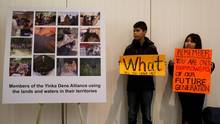Canada’s largest private-sector union has thrown its support behind First Nations in opposing the Northern Gateway pipeline project, vowing to hit picket lines in solidarity if the project goes ahead.
Unifor, formed on Labour Day weekend with the merger of the Canadian Auto Workers and the Communications, Energy and Paperworkers Union of Canada, now has more than 300,000 members across the country.
On Thursday, Gavin McGarrigle, the union’s B.C. area director, signed a new solidarity accord on behalf of the union at a Vancouver media event marking the third anniversary of the Save the Fraser Declaration. The declaration, signed by representatives of more than 130 First Nations, aims to ban oil tankers and pipelines from crossing British Columbia or the ocean migration routes of Fraser River salmon. In a short speech, Mr. McGarrigle said the province needs a “good jobs revolution” with large investments in green jobs, along with significant improvements in public transit and passenger rail networks.
“The Enbridge Northern Gateway Project seeks to massively increase oil exports as if climate change wasn’t real,” he said.
“It proposes to travel through our communities and First Nations with profit as the first motive instead of respecting our environment and social obligations to each other. It creates few jobs in Canada compared to its scale and exports more of our natural resources even faster.”
Unifor represents workers in nearly every sector of the economy, including those in oil and gas, mining and smelting and construction.
Last month, the union released a position paper calling for a Canada-wide moratorium on all new oil and gas fracking, citing concerns over safety and environmental risks as well as a lack of informed consent by First Nations about fracking on native land.
In an interview after the event, Mr. McGarrigle said union members will stand with other opponents in civil disobedience should the project proceed.
“We signed in solidarity, so we’ll be there in solidarity to support them,” he said. “We support lawful and peaceful protest. We know what solidarity means: It means you stand together with a sense of purpose. We have a saying in the labour movement: We’ll be there one day longer.”
Unifor wasn’t the only major union to sign the solidarity accord on Thursday. Glen Hansman, first vice-president of the B.C. Teachers’ Federation, signed on behalf of the union, which represents 41,000 public school teachers.
“As a union, the BCTF has a long history now of trying to raise awareness about aboriginal issues, the rights of aboriginal peoples and the sort of education that needs to occur to support aboriginal learners in our schools,” Mr. Hansman said in an interview. “Reconciliation has to go way past simply a multi-day event, especially here in B.C. where territory is still largely unceded.”
In September, the BCTF participated in the Truth and Reconciliation Commission’s Vancouver event, one of seven national events mandated under the Residential Schools Settlement Agreement between former residential school students, First Nations groups and the government of Canada.
Tom Adair, executive director of the B.C. Council of Film Unions, signed the accord as an individual.
“The issues of the First Nations governments have not been sufficiently addressed,” he said. “The issue of carbon, and putting more and more carbon dioxide into the air, which this would facilitate, is not a long-term, good strategy for the human race.”
Other signatories included members of the local tourism industry, health and conservation organizations, Vancouver’s Green Party Councillor Adriane Carr and Vancouver-West End NDP MLA and opposition environment critic Spencer Chandra Herbert.
The event came less than an hour after the federal government released a report from the Prime Minister’s special envoy in B.C. intended to forge energy partnerships with First Nations.
Energy workers union backs First Nations against Northern Gateway
























Laissez un commentaire Votre adresse courriel ne sera pas publiée.
Veuillez vous connecter afin de laisser un commentaire.
Aucun commentaire trouvé